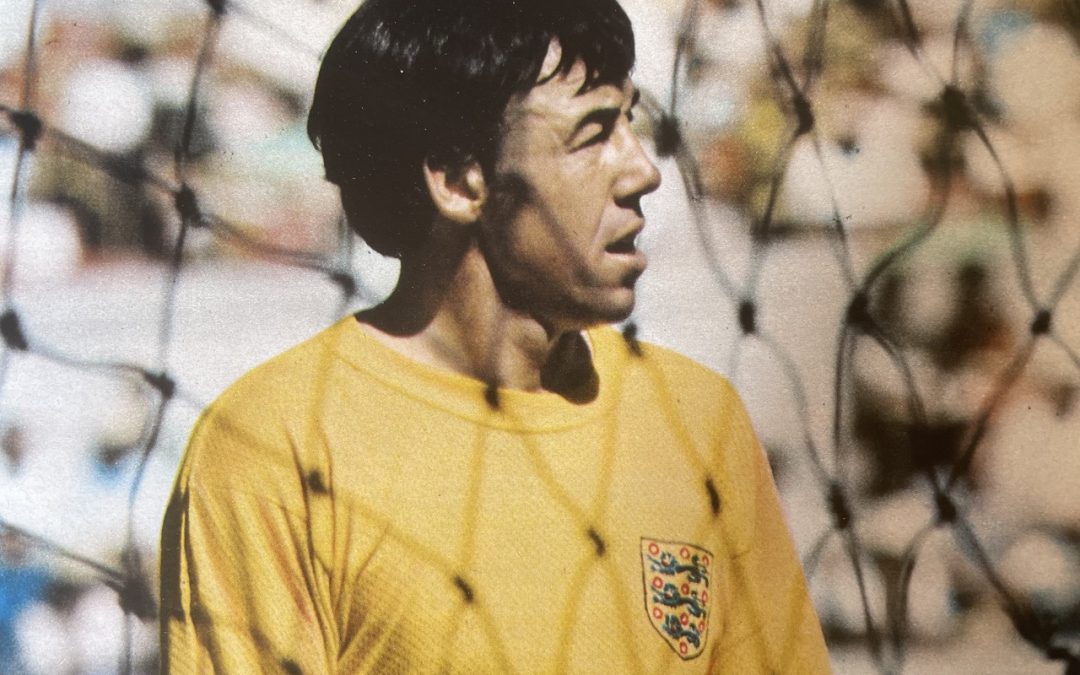GORDON BANKS
BY Vince Cooper

IT is often said that the strength of any great football team starts right at the back. A great goalkeeper not only pulls off wonder saves, he also intimidates opponents along with instilling confidence in his defenders and throughout the side.
In the 1960s England became renowned for producing top goalkeepers with almost every top team seeming to having a standout man in goal who would have been capable of playing for the national team. But to get an England cap they had to get past one man – and that man, of course, was Gordon Banks.
Unlike many who seem to end up as goalkeepers after aspirations of being a top player in another position Gordon, born in 1937, always wanted to be between the posts. He was initially chosen to play for Sheffield boys but never even made it to the match after being dropped because of a poor performance in a Yorkshire Schools cup-tie.
A leap into senior football things didn’t go too auspiciously for the youngster. After starting out his working life as a coalbagger Gordon had moved on to a job as an apprentice bricklayer when he went to watch his local club Millspaugh Steel Works and was asked to go in goal when their regular ‘keeper failed to show up.
After performing decently there it was time to move on to another, stronger, local club Romarsh Welfare and his debut there was in a humbling 12-2 defeat. After the match, he was approached by the manager ‘Are you on the phone Banks’ he would later recall the boss asking. When he replied that he wasn’t he was told ‘Good, we’ll give you a call if we want you again’. He was given another chance but that resulted in a 3-1 defeat after which the 15-year-old returned to Millspaugh
But Gordon kept at it and the perseverance paid off when he was offered a six-match trial with Chesterfield and following that, a part-time contract, at a princely £2 per match. The Derbyshire club has forged a reputation over the years as a breeding ground for top-class custodians and at that time the manager was Teddy Davison himself a former custodian who played over 400 times for Sheffield Wednesday and won an England cap against Wales in 1922.
In the season after he joined, 1955-56, Chesterfield reached the FA Youth Cup final where they faced Manchester United which meant an early clash for Gordon with future England teammate Bobby Charlton. In front of 24,544 fans United raced into a 3-0 lead through Jimmy Carolan, Mark Pearson and Charlton. But Gordon;’s team fought back and goals from Jim Ledger and Peter Mellors left the tie on a knife edge.
The return attracted 15,938 to Saltergate and they saw the home team draw level on aggregate through Keith Havenhand. But in the very last minute Dennis Fidler levelled for the visitors and have them a 4-3 aggregate, maintaining their record of being the only team to win the cup since it’s inception in 1954.
It seemed Gordon was on his way to the top but there was a delay when he was called up for National Service and sent out to Germany, serving his two years with the Royal Signals and winning the Rhine Cup football tournament with his regimental team.
Whilst serving in Germany he met future wife Ursula. They would go on to have three children, Robert, Julia and Wendy and though they separated for a while in the 70s when he went to play in America thry reunited on his return.
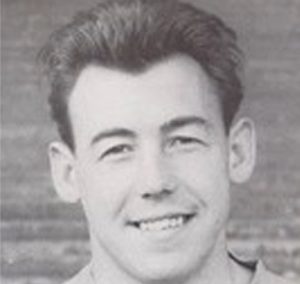
Chesterfield days
Back in civilian life Gordon signed a full-time deal with Chesterfield but he didn’t spend too much time with the Spirerites.
Arsenal boss George Swindin, a former goalkeeper himself, made a bid for him after just a handful of first team starts but Chesterfield, injury-hit and fighting relegation at the time, refused to do business. Leicester City manager Matt Gillies sent the club’s former cup final ‘keeper Jimmy Harrison to scout him and snapped the youngster up in the summer of 1959 for £7,000 after Gordon had played just 23 first-team games. The move boosted his salary to £15 per-week.
CITY INVEST IN BANKS
With Dave MacLaren established as the Foxes first choice it took a while for Gordon to establish himself with the Filbert Street club and he spent some time understudying the Scot. An injury to MacLaren gave him his debut against Blackpool in September 1959 but after two games MacLaren regained full fitness and Banks was sent back to the second team. After City conceded 14 goals in five games the youngster was recalled and he ended the season with 36 first team appearances.
After another three seasons of regular first-team football, his fine form earned Gordon a call-up to the England Under-23 team and when Alf Ramsey took over as England manager he got his full international chance.
Following a 5-2 defeat in France, Ramsey dropped Ron Springett and promoted Gordon for the April 1963 home international match against Scotland. It certainly wasn’t the debut he might have hoped for as the Scots, spurred on by Jim Baxter’s brace, ran out 2-1 victors. Next up was World champions Brazil where a 1-1 draw was a creditable outcome. It soon became clear that he was England’s first-choice and he went on to keep all of those other top ‘keepers at bay and remaining first choice until 1972.

With Leicester at Wembley
CUP FINALS
On the club scene, Gordon reached two FA Cup finals while at Leicester, losing to Tottenham Hotspur in 1961 and to Manchester United two years later. City were very much a cup team at this time and there were also a pair of League Cup finals with a 4-3 aggregate win over Stoke City in 1964 followed by a 3-2 loss to Chelsea a year later.
Defeat to Spurs in the 1961 final saw Leicester play in Europe for the first time. As the Londoners had done the double, they entered the European Cup giving The Foxes a chance in the Cup Winners’ Cup.
A comfortable opening round win over Northern Irish side Glenavon led to a much trickier draw in the next round against Atletico Madrid.
A 1-1 draw at Filbert Street made the Spaniards heavy favourites to progress and they did so although only after being awarded two very controversial penalties. “They were both dubious. I saved the first one. The second one was a diabolical decision and gave them the lead”. Banks later recalled. Atletico went on to win 2-0, and indeed to take the tournament that year.
That 1962-63 season where they lost at Wembley to Manchester United was a real ‘near-miss’ campaign for the Foxes. The ‘big freeze’ of that winter left all teams with a huge backlog of matches as the campaign reached its end. In early April, Leicester played 6 games in 14 days, the last of which was a 4-3 win over Man U which sent them to the top of that table with five matches left to play.
But that condensed run of matches clearly left their mark as City got a solitary point from the five whilst also losing out to United at Wembley.
Throughout that run of matches, indeed throughout his career, Banks maintained his brilliance. Though capable of the spectacular, and of single-handedly keeping his team in matches, one his major attributes was the unfussiness of much of his work and the ability to infuse his teammates with confidence.
JULES IS THE CROWN
As the national team’s number one, Gordon carved out a remarkable record for his country. Playing a total of 73 games for England – of which they lost just nine, he conceded only 57 times and during his country’s run to the 1966 World Cup final, he kept clean sheets in the first four matches before conceding from the penalty spot when Eusebio scored for Portugal in the semi-final, a game he would later recall as his ‘No. 1 England classic’.
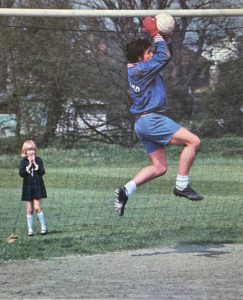
Playing to an audience of one
Before that pulsating semi, England had faced an Argentina side who did their best to turn the quarter-final into a real battle. But the England manager and his men knew what to expect. Before the game, recalls the keeper, Ramsey said to Nobby Stiles ‘your marking Rattin today’ to which Nobby replied ‘just today boss? Not for life?’. England won 1-0 with Rattin, a man Gordon claimed ‘would kick his own father… If he knew who he was’, sent off.
Then onto the Portugal classic, and then to that memorable day when Ramsey’s men claimed the World Cup for the first, and still only, time. And their reward? ‘We got £1,000 each’ recalls Gordon. “The Germans got £7,000 and a Mercedes each for finishing runners-up”.
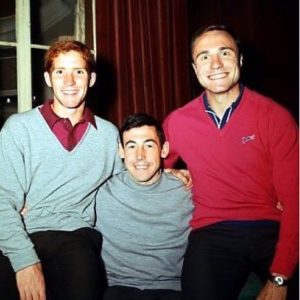
With World Cup teammates Alan Ball and George Cohen
In the match itself England were 2-1 up with the 90 minutes coming to an end when West Germany were awarded a free-kick. The ball was fizzed into the box and, Banks insists, would have gone out of play were it not slowed down by a German arm. Wolfgang Weber was left clear and although the England ‘keeper got close the ball got past him and into the net. Banks and Bobby Moore complained to the referee and appealed for handball but the goal was allowed to stand.
And so to extra time. As the players gathered near the halfway line Alf Ramsey noticed some players were standing and some sitting while the opposition were all sitting. He quickly called those sitting to their feet, saying; ‘let’s not show them we’re as tired as them’. Of course it was England who proved stronger in the extra period.

The final, final whistle in the final
‘MY GREATEST SIGNING’
What came next shocked football. Within ten months of that World Cup triumph, Leicester City, confident a promising Peter Shilton could hold down the first-team job, decided to put Gordon on the transfer list. Despite interest from Liverpool, Wolves, West Ham and others, he decided to stay in the Midlands, moving to Stoke for £52,500. Potters manager Tony Waddington called the arrival: “My greatest signing” and added. “I could never hope to get another bargain like him. He was a steal, an absolute gift”.
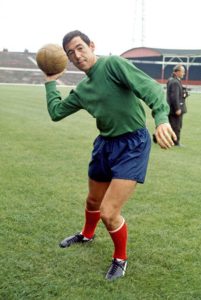
Joining Stoke
When 1970 came around England still relied on the core of the ’66 team. The second group game saw the holders take on favourites Brazil in a match which is remembered to this day for the ‘Save of the Century’. Having been told before the match by Ramsey that he had been awarded the OBE, Gordon went out and put on a masterclass of goalkeeping highlighted by that incredible save from a Pele header.

‘The’ save….
THAT SAVE
An inch perfect cross from Jairzinho saw Pele rise and power a bullet header towards the bottom corner. In his autobiography ‘Banks of England’ Gordon takes up the story: “Pele got above the ball and powered it low and hard towards the corner of the net. It was the perfect header. I was now into a dive to my right and as the ball hit the ground just in front of my goal line I flicked it with my outstretched right hand as it came up”.
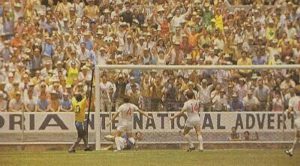
…and from a different angle
Somehow, as Pele shouted ‘Goal’ the strength of Gordon’s ‘flick’ managed to get the ball up and over the crossbar. Speaking shortly before he sadly passed away the great Brazilian, referring to the save, said “I scored over 1,000 goals in my career but I get asked more about one I didn’t score than all of those I did’. Skipper Bobby Moore is reported to have said to Banks at the time; “You’re getting old Banksy, you used to hold on to them”.
But England’s defence of their World crown came to an end a week later in Leon when, without their first-choice goalkeeper who was suffering from food poisoning, they slumped to defeat against West Germany with replacement Peter Bonetti struggling. Gordon became ill the night before the game, but was hopeful of recovering enough to take his place. However he suffered again on the way to the stadium and the defending champions, despite racing into an early lead, were undone by poor tactical decisions and a reserve goalkeeper who was clearly under-prepared.
MORE WEMBLEY JOY
After Mexico, Gordon continued to perform at the peak of his powers and in 1972 played a huge role in Stoke’s biggest success, in the League Cup, the club’s only major trophy, beating Chelsea in the final.
In the semi-final Stoke faced West Ham in an epic encounter that went to four matches before a winner could be found.
City travelled to Upton Park for the second leg of the semi facing a 2-1 deficit from the first match and with their chances written off by many. But this was a Stoke side full of heart as well as quality and thanks to a John Ritchie goal and some great defending they recorded a 1-0 win in 90 minutes sending the match into extra-time.
With just three minutes were left of the extra period Banks was adjudged by referee Keith Walker to have brought down Harry Redknapp and after vehement Stoke protests were turned aside Gordon’s England teammate Geoff Hurst, having scored from the spot in the first leg, stepped up to take the kick.
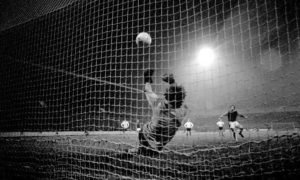
Pushing the Hurst penalty aside
Hurst powered his effort towards goal but Banks having dived in one direction, shot up an arm in the other, pushed the ball over the bar and was immediately engulfed by his celebrating teammates. Gordon would later call the save the greatest he had ever made, eclipsing even the world-famous 1970 effort in Mexico.

Enjoying the morning papers
After a goalless draw in the first replay the teams met for a fourth, final and pulsating time at Old Trafford where goals from Mike Bernard, Peter Dobing and Terry Conroy earned City a memorable 3-2 win. That match also featured a penalty save, this time by Bobby Moore who went in goal after Bobby Ferguson was injured and blocked Bernard’s effort only to see the Stoke man score from the rebound.
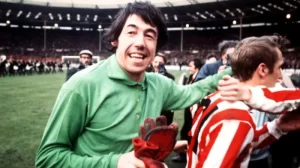
More Wembley celebrations
So it was on to Wembley, scene of Gordon’s greatest moment six years before. There, goals from George Eastham and Conroy again earned City a famous 2-1 victory.
For his efforts on the season, Gordon received the Footballer of the Year award, only the second goalkeeping recipient after Bert Trautmann 17 years before.
THE ACCIDENT
But a career that seemed far from over came to an abrupt end, shortly after the 72-73 season got underway. Returning from the training ground after treatment for an injury following a match with Liverpool, Gordon was involved in a serious car accident which cost him the sight in his right eye.
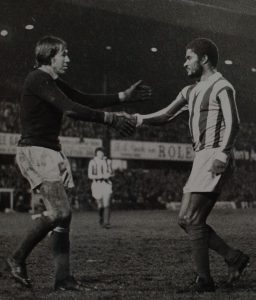
With teammate-for-the-night Eusebio
Stoke granted Gordon a testimonial and on 12 December 1973 they took on Manchester United with 21,038 braving the freezing rain to attend. Stoke fielded a pretty impressive forward line that night with their own top players Jimmy Greenhoff and Geoff Hurst (by now a City player) augmented by Eusebio and Bobby Charlton.
Eusebio gave Stoke the lead but George Best inspired a United comeback and they ran out 2-1 winners
BIG RED BOOK
Also in 1973 It was time for the famous ‘Red Book’ treatment, when Banks, now coaching Stoke’s youth team travelled to London thinking he was going to do some marketing work. Instead, he was surprised by Eamon Andrews who pounced and uttered the famous words ‘Gordon Banlks, This Is Your Life’.

Children Julia, Robert and Wendy bring dad the League Cup
Gordon’s mum, wife Ursula and children Robert, Wendy and Julia were there along with other family members. Staff from North Staffs Hospital where Gordon was treated after his accident praised him whilst from the football world, Sir Alf Ramsey, Geoff Hurst and Bobby Moore all paid tribute. Also present were his Stoke City teammates and, according to Gordon in his autobiography’; “Old school chums and two guys I didn’t know from Adam and still don’t”

With Geoff and Bobby, and Eamon of course
Gordon tried in vain to return to first-team action but eventually realised he was fighting a losing battle and, despite a comeback with Fort Lauderdale Strikers in NASL, the accident effectively brought an amazing career to an end.

Foes and friends
Looking back on his time between the sticks, Gordon admitted that being a ‘keeper got a lot more difficult during his later years. “It is a lot harder now than it was 10 years ago” he said in 1970. “Then wingers were orthodox and you could expect the same type of ball from every cross. Today you find one may be driven hard and low towards the near post, the next is a high one for the big men in the middle. It is impossible to sit back and say you know it all”.
‘I ALWAYS TRIED TO EQUAL. I NEVER SUCCEEDED’
Tributes to Gordon’s upon his retirement came from all quarters. His national team boss Sir Alf Ramsey called him; ‘The finest goalkeeper I’ve ever seen’ whilst fellow World Cup winning goalkeeper Dino Zoff said; “Gordon Banks was the one goalkeeper in the world I always tried to equal. I never succeeded”.
Attempts at coaching never really worked out and an unhappy spell as boss of Alliance Premier League club Telford United brought an end to his efforts in this area.
Gordon’s later years were beset by ill-health. Having had a tumour removed from his stomach during his Leicester days, and had numerous other surgeries, he lost one kidney to cancer and was then informed that he was suffering from it in the other kidney. “Obviously they couldn’t take the other one away so I’ve been having chemotherapy” he said. Sadly the illness eventually got the better of him and Gordon passed away in February 2019.
Speaking after his friend and opponent had passed away Pele said he was ‘glad’ that the ‘keeper made that famous save; “It was the start of a lifetime friendship” the Brazilian said.

Archbishop Desmond Tutu, Gordon, Pele and the statue
In 2008 a statue of Gordon, proudly holding the Jules Rimet trophy aloft, was unveiled by Pele and Archbishop Desmond Tutu before a special ‘Celebration of Peace’ match at the Britannia Stadium between a Gordon Banks XI and a Pele XI
The statue is a fitting tribute to an unforgettable goalkeeper. There is little doubt that when discussions about England’s, and even football’s, greatest ever ‘keeper happen they mostly start and often end, with Gordon Banks

